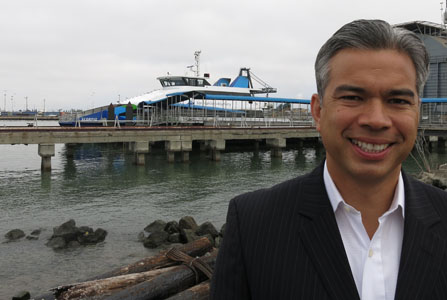Bay Crossings this month debuts a recurring section focusing on important concerns regarding commuter ferry service for Alameda.

California State Assemblyman Rob Bonta at the Alameda Gateway Ferry Terminal. Bonta, a current Alameda resident and a former member of the Alameda City Council, is a full-throated supporter of Alameda ferry service. Photo by Bobby Winston
BC Staff Report
Published: November, 2013
Bay Crossings this month debuts a recurring section focusing on important concerns regarding commuter ferry service for Alameda.
The City of Alameda’s two ferry services, operating from Gateway Alameda and Harbor Bay, are standout successes by every significant measure—ridership levels, community support and importance to the local economy.
Alameda’s ferry services aren’t just crucial for the "Isle of Style," they are also essential to the entire Water Emergency Transportation Authority (WETA) ferry system in the Bay Area because they represent the backbone of WETA’s ridership. WETA is a crucial component of the Bay Area’s earthquake and disaster response infrastructure. Without Alameda’s ferry riders, WETA would likely fall below its mandatory "fare recovery quota" of 40 percent.
Over 3,000 people regularly commute daily on the Alameda/Oakland and Harbor Bay routes. Indeed, Alameda’s ridership represents about 42 percent of WETA’s total ridership, while Vallejo makes up 45 percent, Oakland 9 percent and South San Francisco 4 percent.
Yet recent political developments make troublingly evident that Alameda has been unwise to take its ferry services for granted. Recently, a member of the State Assembly representing Antioch introduced legislation that threatened to erode ferry service subsidies in favor of other jurisdictions, and even change the makeup of the WETA board to the disadvantage of Alameda.
Meanwhile, development and job creation plans within the City of Alameda, including the recently-designated "working waterfront" zone, require studying the feasibility of moving the Gateway Alameda ferry stop to a site on the former Naval Air Base. Alameda ferry riders must engage productively with WETA on these important initiatives.
First up is a conversation with Rob Bonta, the newly minted member of the California State Assembly’s 18th district, encompassing all of Alameda and much of Oakland. Bonta, an Alameda resident and a former member of the Alameda City Council, is a full-throated supporter of Alameda ferry service. Bonta recently took steps to replace former Mayor Beverly Johnson on the WETA governing board with Jeff Del Bono, an Alameda firefighter with a passionate interest in strengthening ferry service.
Bay Crossings: Why do ferries matter to Alameda? Why do they matter to you?
Rob Bonta: Ferries are an important part of Alameda’s mobility and an important part of growing our community’s economy. Given Alameda does not have direct BART service, ferries allow many families to join our community and have good access to job centers in San Francisco. They are also one of things that makes living in Alameda unique in the Bay Area. A ferry to a Giants Baseball game, or to Angel Island is an attraction that helps create the unique experience of Alameda.
BC: What impact will the decision to place WETA’s maintenance facility in Alameda have?
RB: Well, jobs for one. Well-paying middle class jobs is exactly what Alameda lost when the base shut down and one of my priorities is to help bring employment back to Alameda. Also, Alameda is the best-located site for a maintenance facility as we are the geographic center of the ferry routes, and where most of the riders are located.
BC: Alameda has designated a working waterfront zone. Why? What does this mean?
RB: It is not surprising that the America’s Cup teams quickly set up shop in Alameda. Alameda has long had an active and working waterfront. Alameda has the business and labor expertise to support all sorts of marine work and in the future Alameda needs to play to our unique strength in this area.
BC: What does the "Emergency" in WETA’s name mean for Alameda? When will the bond funds allotted to WETA for this purpose be put to use?
RB: First of all, there are two kinds of emergencies. The one created by the BART strike, and a second kind, natural or a man-made physical disaster, such as the loss of a bridge or a highway. WETA has proven in July and now again in October that it plays a critical role for Alameda and the entire East Bay in the event of a BART strike. Given that Alameda is dependent upon our local bridges for our welfare, WETA is a very important insurance policy for us.
BC: Should Alameda worry that service will be curtailed as other communities clamor for ferry service of their own?
RB: Alameda is in a strong position to help our neighbors build ferry services throughout the Bay Area, but in a way that strengthens the ferry system, not weakens it. We have a lot of experience building ferry ridership and we can share that experience with other communities as they seek to join us.
Bay Crossings seeks input and involvement from Alamedans in this effort to preserve the ferry system. Please email joel@baycrossings.com with questions or if you’d like more information.

